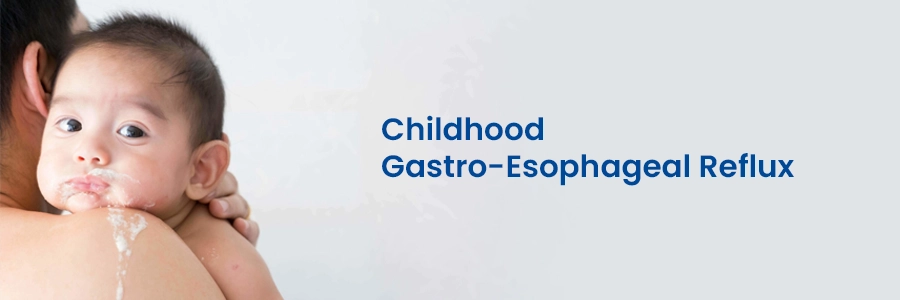- Cardiology 84
- Dermatology 45
- Endocrinology 33
- ENT 16
- Fertility 190
- Gastroenterology 78
- General-Medicine 81
- Gynecology 80
- Hematology 19
- Infectious-Diseases 33
- Neurology 52
- Oncology 34
- Ophthalmology 23
- Orthopedics 69
- Pediatrics 31
- Procedure 23
- Public-Health 144
- Pulmonology 59
- Radiology 8
- Urology 68
- Wellness 161
- Woman-and-child 77

Gastroesophageal Reflux Disease (GERD) in Infants
Gastroesophageal reflux is common in young children and babies. After feeding, every baby experiences a small amount of milk regurgitation, which is most commonly caused by reflux.
- If there are no other symptoms, this regurgitation is harmless in young infants and does not need any treatment or investigation.
- In premature babies and infants with low-weight birth, Gastro-esophageal reflux is more common.
- Gastroesophageal reflux is also common in babies or children with muscle or nerve impairments, like cerebral palsy or cow milk allergy. It occurs in both bottle-fed and breastfed babies.
Why Does Reflux Occur?
- Reflux occurs because of muscle relaxation at the lower end of the oesophagus.
- Because of this, some stomach contents pass into the oesophagus, causing vomiting or regurgitation.
- This can irritate the oesophagus lining as the stomach contents are acidic.
- If the reflux is associated with symptoms like poor weight gain, distressed behaviour, and crying, which are troublesome, then it is known as GERD (Gastroesophageal reflux Disease).
Gastroesophageal Reflux Disease Symptoms
gastroesophageal reflux symptoms lead to vomiting and regurgitation due to some feeds, which is mostly associated with other symptoms.
GERD Symptoms in Babies or Infants
This can include symptoms in babies or infants:
- Crying
- Drawing the legs up towards the abdomen
- Pain in the abdomen after a feed
- Blood in stools(uncommon)
- Refusing feeds
- Occasionally wheezing because of severe reflux
- Poor weight gain
GERD Symptoms in Older Children
Gastroesophageal Reflux Symptoms in older children may include:
- Heat burn
- Foul taste
- Watery fluid into the mouth
Ready to take control of your health journey? Book your appointment now and start your path towards wellness today!
Book an AppointmentList of GERD Diagnosis Tests
- Healthcare providers diagnose Gastro-esophageal reflux mostly by talking to parents or examining the baby, without any investigations required.
- Doctors may advise the parents to maintain a record of how much feed (fluid and food) the baby is having and how often the baby is bringing up the feed.
- The doctor may advise a few more investigations if the reflux symptoms are severe.
The gastroesophageal reflux disease diagnosis includes:
1. Endoscopy
To diagnose any inflammation of the lining of the oesophagus and stomach, a small tube with a camera is inserted into the oesophagus.
2. Monitoring the pH of the oesophagus
A very small probe is inserted into the oesophagus to measure the amount of acid.
3. Barium Swallow
Nowadays, this test is not often performed. The test includes a barium drink and an X-ray.
Treatment for Gastro-esophageal Reflux Disease
- In gastroesophageal reflux in infants, regurgitation is harmless if it is not associated with other symptoms, and it does not need any investigations or treatment.
- Babies or children having reflux with no other symptoms and are otherwise well need no treatment.
- The condition improves after some time. Monitoring the weight of the baby or child is needed to ensure proper growth with appropriate weight.
- Sometimes, reducing the amount of feed (food or fluid) and increasing the frequency of feeding (like feeding more times) may be beneficial.
Conclusion
It is important to note that childhood gastro-esophageal reflux is a prevalent condition and typically benign, particularly when not accompanied by symptoms. Monitoring a child's growth and feeding habits is usually adequate, promoting healthy development as they grow.
Frequently Asked Questions
It's when stomach contents come back up into the food pipe (esophagus), causing discomfort.
GER can happen when the muscle between the esophagus and stomach doesn’t close properly.
Symptoms include spitting up, vomiting, irritability, and trouble feeding.
Doctors diagnose GER based on symptoms and sometimes use tests like an upper GI series or pH monitoring.
Yes, it can often be managed with changes in feeding, such as smaller, more frequent meals and keeping the child upright after eating.
Yes, spicy foods, citrus fruits, and chocolate can sometimes make GER symptoms worse.
For most children, GER improves with age and doesn’t cause long-term problems. In some cases, medication may be needed.
Elevating the head of the crib, feeding smaller amounts more frequently, and avoiding tight clothing around the abdomen can help manage GER symptoms.
If a child has trouble gaining weight, refuses to eat, has breathing problems, or if GER symptoms persist despite home care, medical advice should be sought.
Yes, GER symptoms can sometimes disrupt sleep, causing discomfort for the child. Adjusting feeding habits and sleep positions may help improve sleep quality.

- Cardiology 2132
- Dermatology 168
- Endocrinology 135
- ENT 97
- Fertility 217
- Gastroenterology 232
- General 478
- General-Medicine 1685
- Gynecology 169
- Hematology 85
- Infectious-Diseases 208
- Neurology 207
- Oncology 345
- Ophthalmology 65
- Orthopedics 187
- Pediatrics 83
- Procedure 72
- Public-Health 209
- Pulmonology 126
- Radiology 13
- Second Opinion 311
- Urology 294
- Wellness 600
- Woman-and-child 447
- Others 10217
Related Blogs
If you have any questions, please fill out the enquiry form or call us, and we will get back to you promptly.
040-68334455